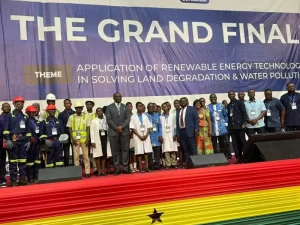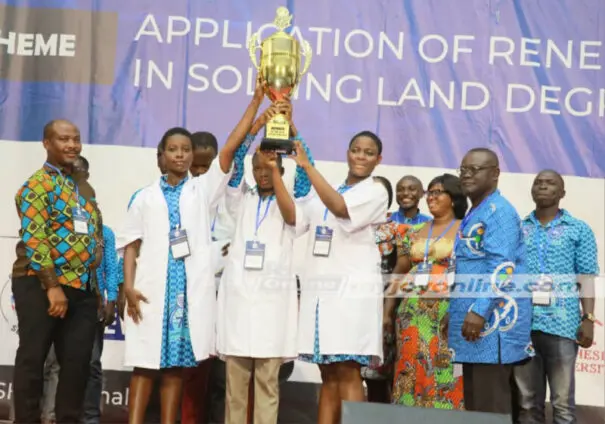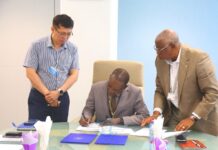By Juliet ETEFE ([email protected])
Kpando Senior High School has emerged champion of the Energy Commission’s SHS Renewable Energy Challenge fifth edition. This marks another milestone in promoting renewable energy education among young Ghanaians.
It topped five other schools in the grand finale, who as well presented innovative projects to tackle environmental challenges by leveraging renewable energy technologies.
Emerging winner with an 85 percent score, Kpando SHS was presented with a cash prize of GHȼ10,000, 25 LED streetlights, one piece of 5KW solar PV system, 40 pieces of solar lamps, 25 copies of GAST books and a plaque.
The team, including students and trainers, however received GHȼ15,000, five laptops, 15 pieces of solar lamps, 20 pieces of solar wall lights, certificates and stationeries.
Dabokpa Technical Institute placed second with a score of 82 percent and received a cash prize of GHȼ7,000, 25 LED streetlights, 25 copies of GAST books, 30 pieces of solar lamps and a plaque.
The team of students and trainers however receives GHȼ10,000, five tablets, 10 pieces of solar lamps, 15 pieces of solar wall lights, certificates and other stationeries.
St. James Seminary SHS came third with a score of 81 percent and received a cash prize of GHȼ5,000, 25 LED streetlights, 15 copies of GAST books, 15 pieces of solar lamps and a plaque.
The team including students and trainers will receive GHȼ10,000, five tablets, 10 pieces of solar lamps, 10 pieces of solar wall lights, certificates and stationeries.
Obuasi Senior High Technical School (80%), Ahantaman Girls’ SHS (79%) and Ola Girls’ SHS Kenyasi (78%) came fourth, fifth and sixth respectively – each receiving a cash prize of GHȼ3,000, 20 LED streetlights, 10 copies of books, 20 pieces of solar lamps and a plaque.
The teams including students and trainers will receive GHȼ5,000, five phones, 10 pieces of solar lamps, certificates and stationeries
The event began in 2019 and has grown into one of the Energy Commission’s flagship programmes, focusing on creating awareness about renewable energy resources and fostering innovative, problem-solving skills in senior high and technical school students.
This year’s edition was under the theme ‘Application of renewable energy technologies in solving land degradation and water pollution’, and saw participation from 109 schools across the country – including 81 mixed schools, 10 boys’ schools and 18 girls’ schools.
These schools competed in regional contests from June to July, culminating with 16 regional winners. The competition then moved to the zonal stage, where the top-six schools were selected for the grand finale.

Speaking at the grand finale, Executive Secretary-Energy Commission, Ing. Oscar Amonoo-Neizer, emphasised that the competition is a crucial platform for inspiring and educating students about renewable energy technologies while encouraging creative solutions to pressing national challenges.
“This challenge is not just a competition, but also a platform for the next generation of innovators and inventors to make a real difference in their communities and beyond,” he noted.
The competition, he said, aligns with the Energy Commission’s mandate under the Renewable Energy Act 2011 (Act 832), which calls for promotion and efficient use of renewable energy resources.
It also contributes to integrating renewable energy technologies and education into the curricula of senior high and technical schools.
He therefore commended the commitment and creativity demonstrated by students throughout the competition; saying the Commission will commit significant resources to support long-term development of the winning projects, ensuring that these innovations move beyond the competition stage.
“Our collaboration with the Council for Scientific and Industrial Research (CSIR) will ensure the sustainability of these projects, enabling them to be refined and commercialised,” he said.
The Executive Secretary expressed his gratitude to supporting partners, including the German Agency for International Cooperation (GIZ), European Union and French Development Agency (AFD) for their invaluable support in making the challenge a success.
He also acknowledged the support of Second Lady Samira Bawumia, who has been instrumental in promoting the Commission’s initiatives.

In her speech, the second lady commended students’ innovative projects, emphasising the need for urgent solutions to environmental challenges affecting health, communities and the economy.
She stressed the importance of using solar, wind and biogas technologies, which not only provide power but also preserve ecosystems and reduce carbon emissions.
She further urged students to remain dedicated in developing solutions for the benefit of their communities, recognising that innovations such as solar-powered irrigation and biogas technology offer tangible ways to combat land and water degradation.
She therefore called on stakeholders to support the projects’ development and commercialisation, ensuring their positive impact extends beyond the competition to benefit the wider community.
With over 2,000 premature deaths in Ghana annually attributed to unclean cooking methods, Samira underscored the significance of transitioning to cleaner technologies such as electric and LPG cooking.










